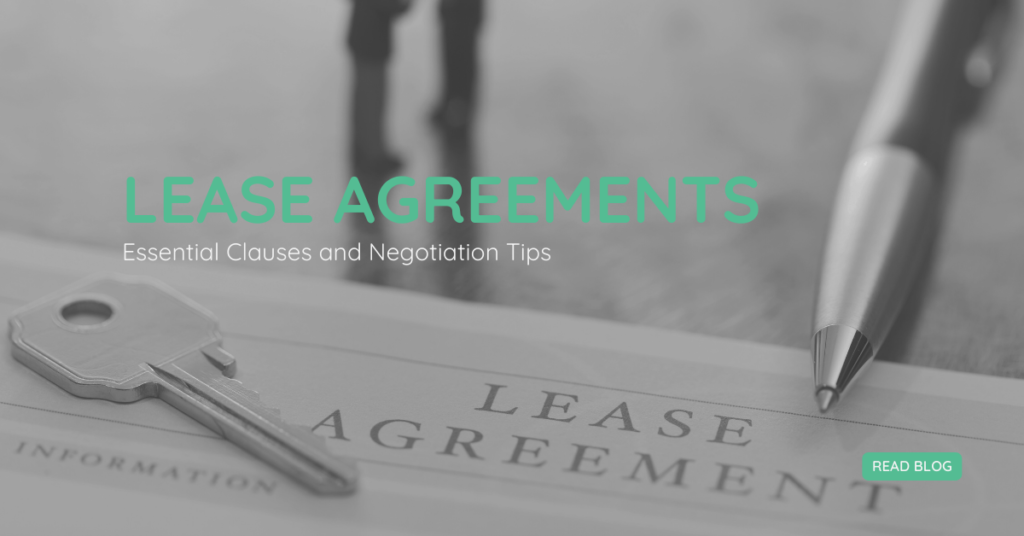Lease Agreements: Essential Clauses and Negotiation Tips
Reading Time: 2 minutesRenting a commercial or residential property involves navigating a complex legal agreement known as a lease. Ensuring your lease includes the right clauses and negotiating favorable terms are crucial to protecting your interests as a tenant. In this article, we’ll explore the essential lease clauses you should consider and provide tips for effective lease…

Renting a commercial or residential property involves navigating a complex legal agreement known as a lease. Ensuring your lease includes the right clauses and negotiating favorable terms are crucial to protecting your interests as a tenant.
In this article, we’ll explore the essential lease clauses you should consider and provide tips for effective lease negotiations.
Table of Contents
Essential Lease Clauses

1. Severability Clause
This clause ensures that if any part of the lease is deemed invalid, the rest of the agreement remains enforceable. It’s a critical safeguard against the entire lease being invalidated by the courts.
2. Joint and Several Liability
This clause holds all tenants equally responsible for the full rent payment, even if one or more roommates fail to pay their share. It helps ensure the landlord receives the complete rent amount each month.
3. Occupancy Limits
Clearly defining the maximum number of occupants allowed in the property helps prevent overcrowding, damage, and disturbances. This clause should align with any applicable state or local laws.
4. Noise and Disturbance Restrictions
Outlining rules around excessive noise, parties, and other potential disturbances can help maintain a peaceful living environment for all tenants.
5. Surrender of Premises
This clause specifies the move-out procedures, fees, and conditions the tenant must follow when vacating the property at the end of the lease term.
Effective Lease Negotiation Tips

1. Understand the Details
Commercial leases can be complex, with fine print that can significantly impact your tenancy. Carefully review all clauses and seek clarification on any ambiguous terms.
2. Leverage Competition
If you’re negotiating for a desirable property, use the competition to your advantage. Demonstrate that you have other options and are willing to walk away if your terms are not met.
3. Verify the Landlord’s Math
Don’t take the landlord’s calculations at face value. Carefully review the numbers, such as operating expenses and taxes, to ensure you’re not overpaying.
4. Consider Hiring a Tenant Representative
A tenant representative, or “tenant rep,” can be a valuable asset in commercial lease negotiations. They have extensive market knowledge and can help you secure the best deal.
5. Understand the Power of Lease Term Length
Landlords often prefer longer-term leases, as they provide more stability. If you can commit to a longer lease, you may be able to negotiate more favorable terms, such as lower costs.
Conclusion
Remember, a well-crafted lease agreement and effective negotiation strategies can make a significant difference in your overall tenancy experience. By understanding the essential clauses and employing these negotiation tips, you can secure a lease that protects your interests and sets you up for success.
Looking for a trusted property management partner to handle your commercial or residential lease agreements? Contact Green Ocean Property Management today and let us guide you through the process with our expertise and personalized service.
Mailbox Landscaping Ideas: Gardening at the Curb
Reading Time: 2 minutesFirst impressions are crucial for attracting tenants, and a well-maintained mailbox surrounded by a charming garden bed can be a game-changer. But with multiple properties to manage, finding the time and inspiration for landscaping projects can be a challenge. This guide provides property owners and managers with easy-to-implement ideas to spruce up the mailbox areas…
Proactive Solutions to Say Goodbye to Pigeon Problems
Reading Time: 2 minutesToday, we’re addressing a pesky issue many property owners face – pigeon problems. These feathered friends might seem harmless, but their presence can create noise, mess, and trouble for our property and residents. We’re here to share our cost-effective and humane approach to resolving this matter. The Cost Challenge Dealing with unwanted animals…
5 Most Affordable Ways to Increase Curb Appeal
Reading Time: 2 minutes In today’s article, we’re going to be talking about the best and easiest and most affordable ways to increase the curb appeal of your property. Prospective renters or even your current renters come to the property and they feel like they’re at home and they want to pay more money and more rent…







